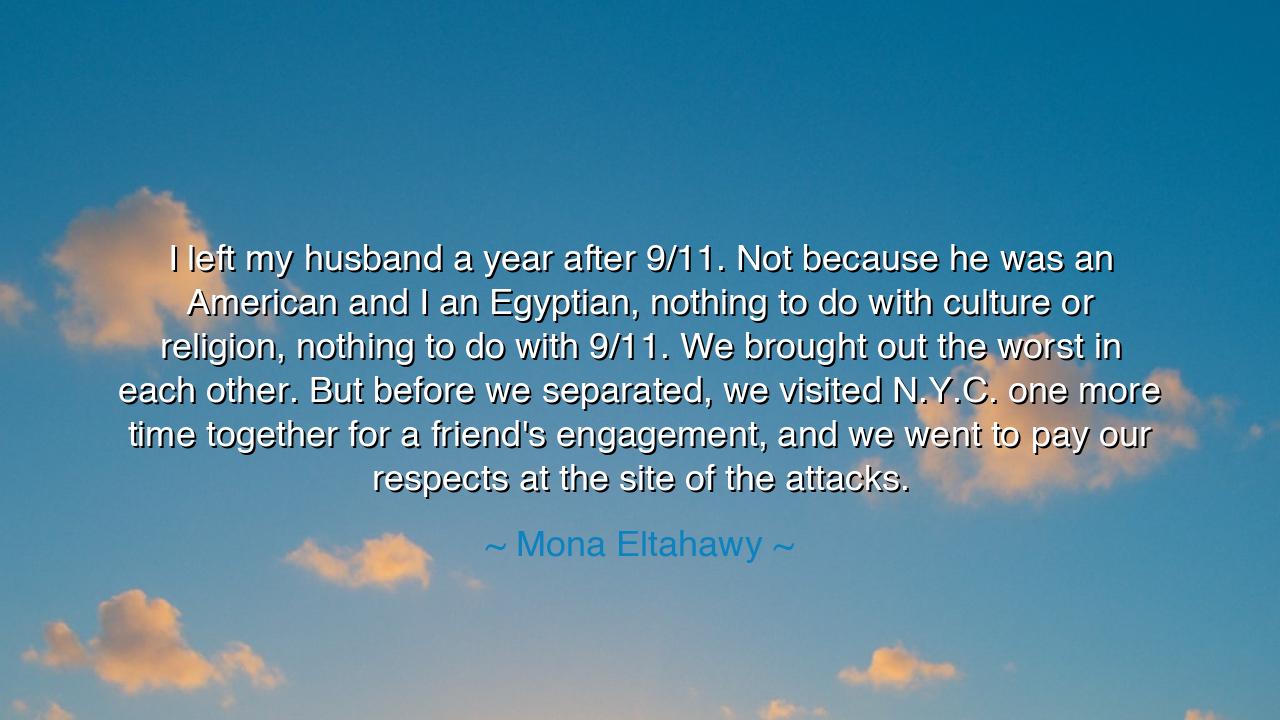
I left my husband a year after 9/11. Not because he was an
I left my husband a year after 9/11. Not because he was an American and I an Egyptian, nothing to do with culture or religion, nothing to do with 9/11. We brought out the worst in each other. But before we separated, we visited N.Y.C. one more time together for a friend's engagement, and we went to pay our respects at the site of the attacks.






In the brave vulnerability of her words, Mona Eltahawy, the Egyptian-American writer and activist, once said: “I left my husband a year after 9/11. Not because he was an American and I an Egyptian, nothing to do with culture or religion, nothing to do with 9/11. We brought out the worst in each other. But before we separated, we visited N.Y.C. one more time together for a friend's engagement, and we went to pay our respects at the site of the attacks.” This reflection, tender and unflinching, is not merely a story of loss — it is a meditation on the intersection of love, identity, and humanity in a time of profound upheaval. Eltahawy speaks here as one who has lived between worlds, and who knows that even amid tragedy and division, the human heart remains capable of compassion and truth.
The origin of this quote lies in Eltahawy’s deeply personal life, entwined with the currents of world history. As an Egyptian Muslim woman married to an American man, she lived through the years surrounding September 11, 2001, when suspicion, fear, and prejudice surged like a storm across nations. Yet her separation, she insists, was not born of the political or religious turmoil that consumed the globe — it was simply the end of a personal bond that had run its course. Her words remind us that while history may shape the world around us, the struggles of the heart obey no flag and no faith. Love and pain are universal.
When she says, “We brought out the worst in each other,” there is both sorrow and wisdom. It is the recognition that even those who begin in love can, through time and circumstance, become mirrors of each other’s shadows. To part, then, is not always an act of defeat, but sometimes of mercy. And yet, what makes this story sacred is the moment that follows — when, before parting, they visit New York City, the wounded heart of a nation, to pay their respects. In that shared act of mourning, they transcend their personal fracture. Two individuals, divided in love but united in grief, stand before the ruins of the world’s pain and find a fleeting stillness. That moment becomes the quiet bridge between endings and forgiveness.
Eltahawy’s words also carry the spirit of resilience — the courage to face complexity without surrendering to bitterness. The world after 9/11 was one of division: East against West, Islam against America, fear against trust. But in her story, we see that human connection can exist even amid such fault lines. She rejects the easy narratives — that religion, nationality, or ideology must define one’s choices — and insists upon the deeper truth: we are not symbols of our nations, but souls bound by shared humanity. In the act of visiting Ground Zero, she and her husband honor not only the dead, but also the possibility of empathy between peoples who were taught to mistrust one another.
This truth is echoed throughout history. When the American Civil War ended, Abraham Lincoln, weary yet resolute, urged reconciliation with the words, “With malice toward none, with charity for all.” He understood that healing requires not vengeance, but empathy — the same quiet understanding that Eltahawy and her husband embodied in their final shared pilgrimage. Though their marriage ended, their act of respect became a symbol of something larger: that even in separation, compassion can survive.
The lesson, then, is one of grace amid endings. Not all things last, yet all things can be honored. Love that fails is not love wasted if it teaches us humility, self-knowledge, and kindness. And even in moments of personal ruin, we can choose to rise — not with anger, but with reverence for what was and for the world that continues beyond us. Eltahawy’s story reminds us that our private journeys are not isolated from the larger world; every act of empathy contributes to the healing of humanity itself.
So, my children, take this wisdom to heart: let no border divide your compassion, and let no ending extinguish your tenderness. When something precious falls apart — a relationship, a dream, a world — do not curse the breaking. Instead, as Mona Eltahawy did, stand before the ruins, bow your head, and give thanks for the love that once was and for the life that still is. For as long as the human heart can feel sorrow and still choose understanding, there remains hope for a gentler world — one rebuilt not upon fear or division, but upon the quiet power of empathy and remembrance.






AAdministratorAdministrator
Welcome, honored guests. Please leave a comment, we will respond soon